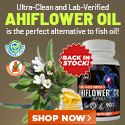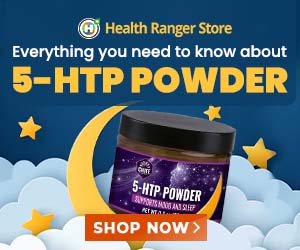
M. D. Anderson teaches the art of aromatherapy to soothe and heal (press release)
Friday, October 13, 2006 by: NewsTarget
Tags: health news, Natural News, nutrition
- Aerosolized bioweapons? Strange “diploid biomasses” falling out of the sky in Florida captured under the microscope
- Israeli lobbyists boast of controlling US national security policy in leaked AIPAC audio
- Widespread social and economic unrest: Steve Quayle issues urgent financial warning of imminent asset collapse in new interview with Mike Adams
- U.S. lawmakers investigate Meta over alleged China collaboration
- Analysis: The coming economic collapse, a mass uprising and Trump's three secret weapons to halt the growing revolt
- Fauci is back in the limelight, and he’s busy promoting a future COVID or FLU pandemic
- Kiss Your Genetic Privacy Good-Bye! 23andMe Gets Green Light to Sell Your Intimate Genetic Details to Anyone They Want
- Mike Adams releases country western hit single: Goin’ Back in Time is Comin’ Home
- Warp Speed 2.0: Trump Administration ACCELERATES Gates-funded, self-amplifying bird flu vaccines
- TAKE IT DOWN Act advances in Congress amid free speech concerns
- CLOT SHOT PLANDEMIC UNFOLDING: Fibrous, rubbery clots caused by covid injections have prion-like seeding activity
- DMSO and Natural Dyes: A suppressed cancer treatment resurfaces in independent research
- Tulsi Gabbard leads charge against the Biden regime’s global censorship of the 'Disinformation Dozen'
- Father speaks out: Challenging the mainstream narrative of his daughter’s “unvaccinated measles death”
- Defunding DEADLY mRNA jabs: Government funding for mRNA technology being scrutinized and sidelined until proven "safe and effective" for real
- Curcumin’s ancient healing power supercharges muscle recovery, and its effects are compounded with anti-inflammatory foods and supplements
- Chemical cocktails in processed foods linked to diabetes, validating natural health warnings
- Pfizer's RSV vaccine linked to preterm births as drug giant CONCEALED RISKS from pregnant women in unethical clinical trials
- Aerosolized bioweapons? Strange “diploid biomasses” falling out of the sky in Florida captured under the microscope
- Fauci is back in the limelight, and he’s busy promoting a future COVID or FLU pandemic
- Tulsi Gabbard leads charge against the Biden regime’s global censorship of the 'Disinformation Dozen'
- Analysis: The coming economic collapse, a mass uprising and Trump's three secret weapons to halt the growing revolt
- Widespread social and economic unrest: Steve Quayle issues urgent financial warning of imminent asset collapse in new interview with Mike Adams
- Kiss Your Genetic Privacy Good-Bye! 23andMe Gets Green Light to Sell Your Intimate Genetic Details to Anyone They Want
- U.S. lawmakers investigate Meta over alleged China collaboration
- Mike Adams releases country western hit single: Goin’ Back in Time is Comin’ Home
- Israeli lobbyists boast of controlling US national security policy in leaked AIPAC audio
- Chemtrails unveiled: How the CIA and Big Business are manipulating the weather for profit
- Curcumin’s ancient healing power supercharges muscle recovery, and its effects are compounded with anti-inflammatory foods and supplements
- CLOT SHOT PLANDEMIC UNFOLDING: Fibrous, rubbery clots caused by covid injections have prion-like seeding activity
- China’s counter-tariff strategies: A new chapter in the U.S.-China trade war
- Pfizer's RSV vaccine linked to preterm births as drug giant CONCEALED RISKS from pregnant women in unethical clinical trials
- Shedding light on the dark side of MMR vaccines: How vaccinated individuals SPREAD MEASLES & put the vulnerable at risk
- Dane Wigington exposes climate engineering as ‘All-Out Weather and Biological Warfare’
- Defunding DEADLY mRNA jabs: Government funding for mRNA technology being scrutinized and sidelined until proven "safe and effective" for real
- DEATH by VACCINE or face PRISON time: Canadian Freedom Convoy leaders CONVICTED for protesting forced vaccination during the Covid Plandemic
- Newly released JFK files reveal Pentagon's role in creating Lyme disease and covid in the same lab
- Analysis: The coming economic collapse, a mass uprising and Trump's three secret weapons to halt the growing revolt
- Mike Adams releases country western hit single: Goin’ Back in Time is Comin’ Home
- Aerosolized bioweapons? Strange “diploid biomasses” falling out of the sky in Florida captured under the microscope
- Kiss Your Genetic Privacy Good-Bye! 23andMe Gets Green Light to Sell Your Intimate Genetic Details to Anyone They Want
- European Court of Justice: Healthcare professionals who promoted or administered COVID-19 vaccines are CRIMINALLY LIABLE for any harm caused
- Federal employees whine over DOGE's new directive requiring them to do a 5-point summary of weekly accomplishments
- U.S. approves new Russian ambassador as diplomatic thaw continues
- Government waste exposed: Hegseth supports Musk’s demand for accountability from federal workers
- Now you can HEAR chemistry: Health Ranger translates molecules into music in stunning video demonstration that will blow your mind (and your ears)
- Widespread social and economic unrest: Steve Quayle issues urgent financial warning of imminent asset collapse in new interview with Mike Adams
- Dr. Mike Yeadon releases 15-minute testimony - WATCH - about genocidal intent of COVID “vaccines”
- The Health Ranger releases “Vaccine Zombie” song and music video, using AI-animated zombies for the music video
- Trump reverses course on Gaza plan, says “nobody is expelling Palestinians”
- EPA advisor admits the agency is funneling billions to climate groups ahead of Trump’s return to White House
- 5 Simple steps to boost your brainpower: How to strengthen executive function in a distracted world
- I Want My Bailout Money – new song and music video released by Mike Adams
- Tulsi Gabbard leads charge against the Biden regime’s global censorship of the 'Disinformation Dozen'
- Red Cross issues warning to stop blood plasma donations from vaccinated people
- Scientists confirm: GENIUS brain function can be spontaneously unleashed in humans without any apparent cause
- EPA advisor admits the agency is funneling billions to climate groups ahead of Trump’s return to White House
- HYSSOP: What research reveals about the health benefits of this ancient holy herb
- Two containers with completed ballots fall out of truck in Florida
- Newly released JFK files reveal Pentagon's role in creating Lyme disease and covid in the same lab
- Global leaders unite to clamp down on “misinformation” with UN-backed Cascais Declaration
- BREAKING: 2025 NDAA authorizes mandatory military draft of WOMEN across America… as Pentagon pursues global NUCLEAR war with both Russia and China at the same time
- Mike Adams releases country western hit single: Goin’ Back in Time is Comin’ Home
- Michael Yon warns of a ZIONIST TAKEOVER in Trump’s second administration
- Ozempic and Wegovy weight loss drugs are injectable LIZARD VENOM PEPTIDES that may unleash a devastating wave of organ failure… side effects align with symptoms of SNAKE BITES
- The Health Ranger releases “Vaccine Zombie” song and music video, using AI-animated zombies for the music video
- BOMBSHELL: DNA testing kits are a SCAM to develop ethnic-specific bioweapons
- Israeli soldiers accused of even more torture and abuse in the West Bank
- These 13 countries just signed an agreement to engineer a global FAMINE by destroying food supply
- I Want My Bailout Money – new song released by Mike Adams
- NASA admits that climate change occurs because of changes in Earth’s solar orbit, and NOT because of SUVs and fossil fuels
- RFK Jr. clears key hurdle: Sen. Susan Collins backs controversial HHS nominee, signaling a new era for health policy
Scan the shelves of the local bath and body stores and one is sure to find products labeled for aromatherapy. Many might be surprised to learn the science behind it. So what is aromatherapy, how is it used and will those products actually work?
Cherie Perez, a supervising research nurse in the Department of Genitourinary Medical Oncology, teaches a monthly aromatherapy class to answer those questions for cancer patients and caregivers undergoing treatment at M. D. Anderson Cancer Center. Perez's classes are offered free of charge through M. D. Anderson's Place... of wellness, a center within the institution that focuses on helping patients and caregivers deal with the non-medical issues of living with cancer, and is the first complementary therapy facility to be built on the campus of a comprehensive cancer center.
Perez, who first became involved with aromatherapy to help relieve the physical pain and discomfort caused by fibromyalgia, shares her professional knowledge of the basics of aromatherapy, safety precautions and interactive demonstrations in each hour-long class.
Oils and healing
While essential oils may not directly stimulate the immune system, they can complement cancer treatment by boosting the system's ability to fight off infections, says Perez.
Certain oils can also stimulate lymphatic drainage or have antibacterial properties. Since it has many potential uses ranging from managing anxiety and nausea to helping with sleep, general relaxation, memory and attention, many individuals, including cancer patients, can benefit from aromatherapy [See Sidebar 1: Five Oils to Reduce Stress and Relieve Ailments.]
There are a variety of different products and methods of diffusion to obtain the healing benefits of oils. Some oils - like lavender, ylang ylang and sandalwood can be applied directly to the skin - while others are too concentrated and need to be diluted into carriers such as massage oils, bath soaps and lotions [See Sidebar 2: Everyday Uses for Aromatherapy.] Most typically, Perez advises patients to put a few drops of an oil, or a combination of oils onto a handkerchief and "fan themselves like Scarlett O'Hara." Burning oils or incense is not recommended because most are poorly constructed and give off unhealthy fumes and soot.
Who should, or shouldn't, use oils?
Widely sold in health food stores and beauty chain stores, essential oils do have chemical properties that can affect the brain and enter the bloodstream, and for some patients may be toxic when combined with common cancer therapies such as chemotherapy and radiation therapy. Perez says essential oils, like many medicines, can increase a person's sensitivity to the sun and should be used with caution. Patients should always inform and discuss with their physicians before using aromatherapy oils to complement a medical condition.
People with high blood pressure should avoid hyssop, rosemary, sage and thyme, while diabetics should avoid angelica oil. Women who are pregnant or nursing should avoid a number of oils that stimulate the uterus including star anise, basil and juniper to name a few and should use with caution peppermint, rose and rosemary in the first trimester. According to Perez, pediatric patients can use aromatherapy essential oils in very low concentrations. [See Sidebar 3: Tips for Buying Oils.]
Aromatherapy's role in cancer treatment
"The nature of aromatherapy makes it challenging to study due to the fact that it is difficult to create a placebo and every person is different in their nasal sensitivities and skin absorption rates," says Perez. In the future, however, she would be interested in designing research to examine how aromatherapy can be used to treat/heal burns caused from radiation treatment safely and effectively, soothe pre-treatment anxiety and manage loss-of-memory issues in cancer survivors.
Contact: Lindsay Anderson lindsay.anderson@gabbe.com 212-220-4444 University of Texas M. D. Anderson Cancer Center
Health news at FETCH.news
Get independent news alerts on natural cures, food lab tests, cannabis medicine, science, robotics, drones, privacy and more.
Take Action: Support Natural News by linking to this article from your website
Permalink to this article:
Embed article link: (copy HTML code below):
Reprinting this article:
Non-commercial use OK, cite NaturalNews.com with clickable link.
Follow Natural News on Facebook, Twitter, Google Plus, and Pinterest
Science News & Studies
Medicine News and Information
Food News & Studies
Health News & Studies
Herbs News & Information
Pollution News & Studies
Cancer News & Studies
Climate News & Studies
Survival News & Information
Gear News & Information
News covering technology, stocks, hackers, and more



"Big Tech and mainstream media are constantly trying to silence the independent voices that dare to bring you the truth about toxic food ingredients, dangerous medications and the failed, fraudulent science of the profit-driven medical establishment.
Email is one of the best ways to make sure you stay informed, without the censorship of the tech giants (Google, Apple, Facebook, Twitter, YouTube, etc.). Stay informed and you'll even likely learn information that may help save your own life."
–The Health Ranger, Mike Adams













































